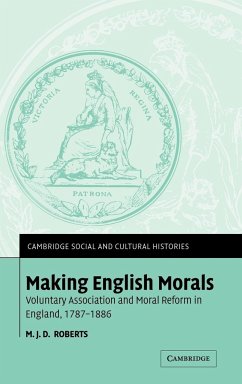Short description/annotation
An exploration of the volunteer networks for moral reforms of late Georgian and Victorian England.
Main description
Campaigns for moral reform were a recurrent and distinctive feature of public life in later Georgian and Victorian England. Anti-slavery, temperance, charity organisation, cruelty prevention, 'social purity' advocates, and more - all promoted their causes through mobilisation of citizen volunteer support. This book sets out to explore the world of these volunteer networks, their foci of concern, their patterns of recruitment, their methods of operation, and the responses they aroused. In its exploration of this culture of self-consciously altruistic associational effort, the book provides the first systematic survey of moral reform movements as a distinct tradition of citizen action over this period, as well as casting light on the formation of a middle-class culture torn, in this stage of economic and political nation-building, between acceptance of a market-organised society and unease about the cultural consequences of doing so. This is a revelatory book that is both compelling and accessible.
Table of contents:
Introduction; 1. Moral reform in the 1780s: the making of an agenda; 2. 'The best means of national safety' : Moral reform in wartime, 1795-1815; 3. Taming the masses, 1815-1834; 4. From social control to self-control, 1834-1857; 5. Moral individualism: the renewal and reappraisal of an ideal, 1857-1880; 6. The late Victorian crisis of moral reform: the 1880s and after.
Hinweis: Dieser Artikel kann nur an eine deutsche Lieferadresse ausgeliefert werden.
An exploration of the volunteer networks for moral reforms of late Georgian and Victorian England.
Main description
Campaigns for moral reform were a recurrent and distinctive feature of public life in later Georgian and Victorian England. Anti-slavery, temperance, charity organisation, cruelty prevention, 'social purity' advocates, and more - all promoted their causes through mobilisation of citizen volunteer support. This book sets out to explore the world of these volunteer networks, their foci of concern, their patterns of recruitment, their methods of operation, and the responses they aroused. In its exploration of this culture of self-consciously altruistic associational effort, the book provides the first systematic survey of moral reform movements as a distinct tradition of citizen action over this period, as well as casting light on the formation of a middle-class culture torn, in this stage of economic and political nation-building, between acceptance of a market-organised society and unease about the cultural consequences of doing so. This is a revelatory book that is both compelling and accessible.
Table of contents:
Introduction; 1. Moral reform in the 1780s: the making of an agenda; 2. 'The best means of national safety' : Moral reform in wartime, 1795-1815; 3. Taming the masses, 1815-1834; 4. From social control to self-control, 1834-1857; 5. Moral individualism: the renewal and reappraisal of an ideal, 1857-1880; 6. The late Victorian crisis of moral reform: the 1880s and after.
Hinweis: Dieser Artikel kann nur an eine deutsche Lieferadresse ausgeliefert werden.








